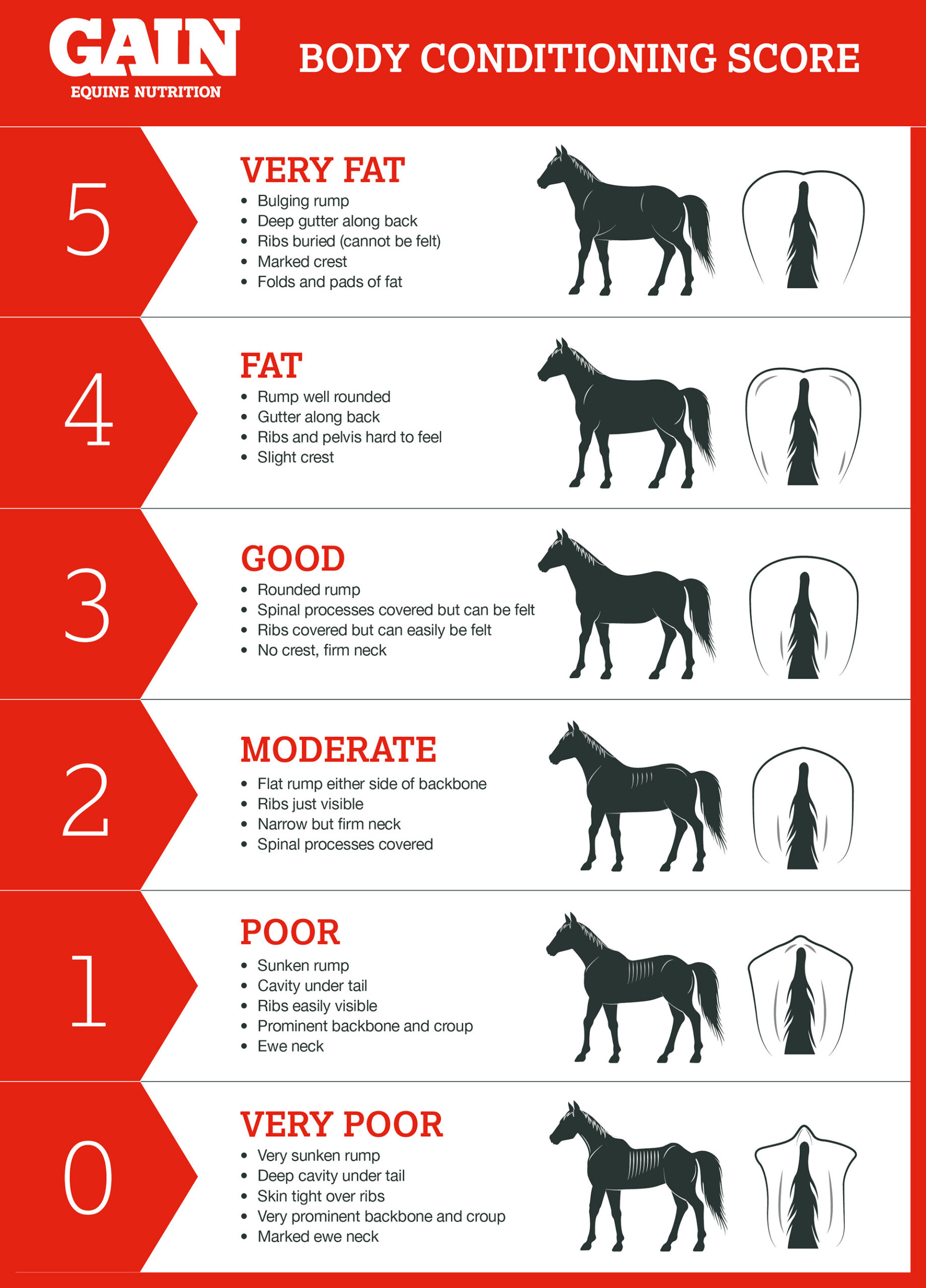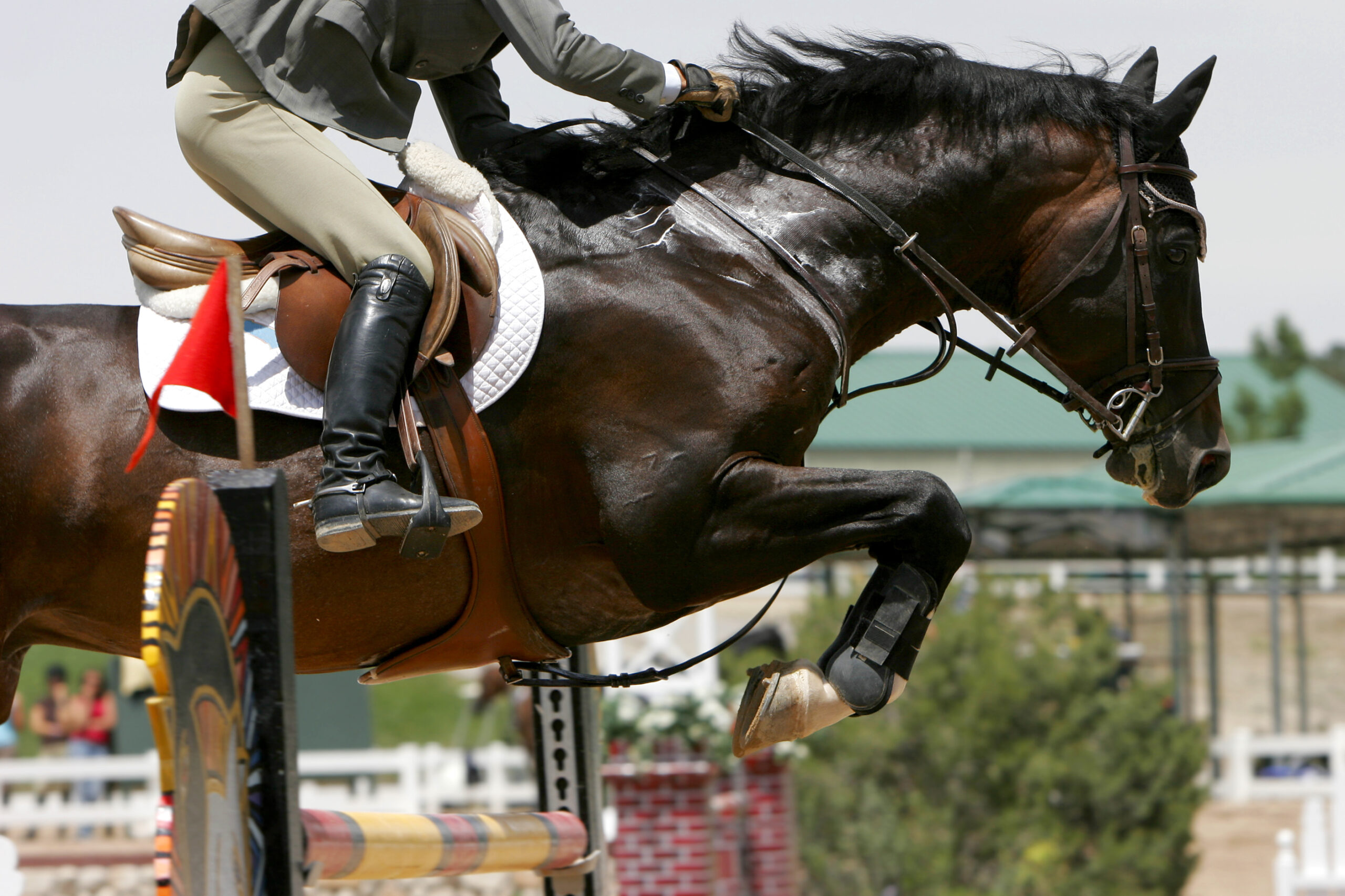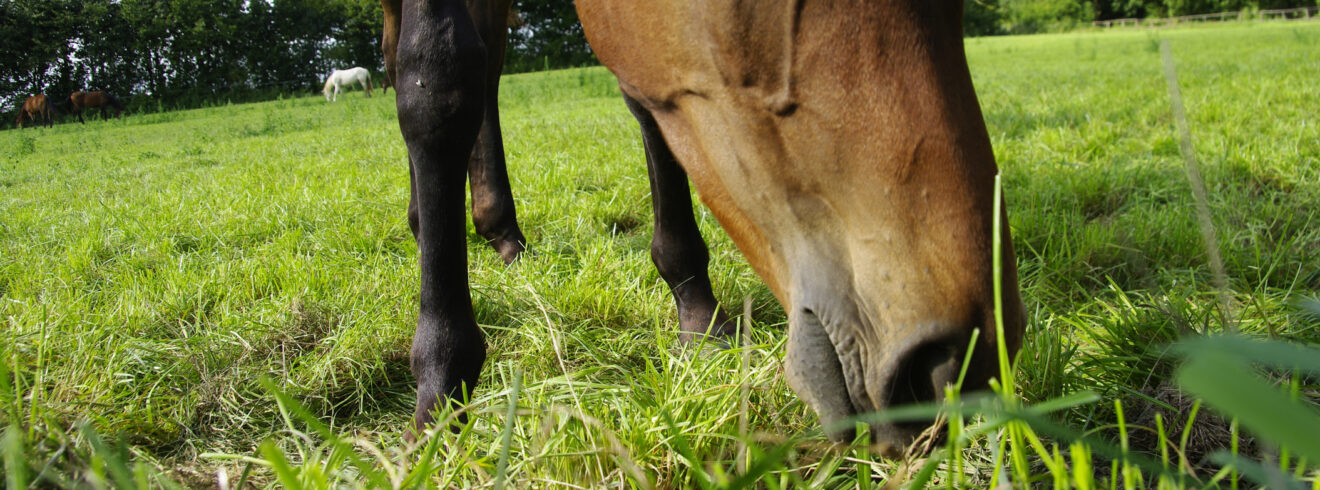Changes to grazing and workload can happen throughout the summer months, which means it is a good time to asses your horses’ condition and adjust the diet as necessary.
It is important that this is done based on the individual horse and not to make changes across the board. Requirements can vary as some horses’ condition and energy levels are relatively stable whereas others are more susceptible to change.
Body Condition Scoring: This is an objective method of assessing your horse’s body condition. The level of fat covering is scored using a numeric system of either 0 (emaciated) – 5 (obese) or the Henneke method which is 1 (emaciated) -9 (extremely fat)
*Tip: keep notes to refer to each time you record your horse’s ‘Body Condition Score’ and taking photos may also be useful.
Method: Assessing Body Condition Score needs to be ‘hands on’ as this will help you to determine between fat and muscle. Visually split your horse into 3 main sections –
- Neck, shoulder and wither area.
- Barrel/ribs and back.
- Quarters, thigh and head of tail.
Feel each area and assess the fat covering, giving a score and then divide your total score by 3 to give you the average.

Weighing: If possible horses should be weighed, use of a weigh tape is sufficient but is not totally accurate it is best to keep a record of your measurements to record and relate any changes in weight over time.
It is important when using a weigh tape to ensure that the horse is standing squarely on a hard, flat surface. The weigh tape is placed over the lowest point of the wither passing around the horse as close as possible to the back of the elbow on a slightly diagonal angle. Be careful not to pull the tape too tight and do not hold your fingers under the tape as this may give a false reading. It is important to have an accurate idea of your horse’s weight to allow you to calculate the feed ration, to assess any weight gain/loss and to allow you to correctly dose and administer wormers or medication.
Grazing: Generally speaking both the quality and quantity of grazing increases during the summer months. In their natural habitat, it would be usual for horses to gain weight in the summer to enable them to cope better when grazing is less abundant during the winter months. It is important that this is taken into consideration when planning your horse’s summer diet. It may be necessary to restrict your horses grass intake and this can be done using various methods – e.g strip grazing, grazing with others, rotational grazing with livestock or introducing a grazing muzzle.
As pasture can often be deficient in certain minerals (mainly Sodium, Selenium and Copper), it is important that the horses’ nutrient requirements are still met when turned out to grass. Feeding a balancer such as GAIN Opti-Care Balancer – a nutrient rich, multi-purpose Balancer with a low starch, non-heating formulation will ensure you provide them with the correct balance of nutrients when grazing.
Water: Water is essential to a horse’s health and makes up around 65%-70% of a horses body, with the average horse drinking between 20-40 litres per day. It is important to check water troughs daily, ensuring that your horse has access to clean fresh drinking water.
Electrolytes: Electrolytes are salts that are lost in sweat and urine. The requirement to supplement electrolytes will vary depending upon factors such as weather and workload e.g requirements will increase in hot humid weather. Increased work regimes can also cause excessive sweating and increase the need for rapid rehydration.

It is important to feed an electrolyte, either in your horses’ water or in feed, as a horse’s body cannot retain water without the presence of electrolytes. Electrolyte powders and pastes typically contain Sodium, Chloride, Potassium, Calcium, Phosphorus and Magnesium.
Horses that are stabled or have access to a field shelter should be provided with a salt lick. Horses should be fed electrolytes whenever they sweat after work.
Energy: As the competition season progresses, the energy requirements of a horse/pony in work over the summer months will increase according to their workload. The body of the horse is well adapted to storing and mobilising energy from various types of nutrients such as fibre, sugar, starch and fat. There is a significant increase in energy requirement for horses in intense versus moderate exercise.
In addition to energy provided by good quality pasture, hay or haylage, a horse or pony at competition level will require energy, trace minerals and antioxidant support from a concentrate diet. There are many options within the GAIN range of feeds for the competition horse.
Some contain highly digestible cereals (such as 14% Equine Cooked Mix) this provides quick releasing energy and other options contain a lower amount of cereals and a higher amount of oil and digestible fibres (such as Freedom Mix and Freedom Cubes) provide a slower release of energy. Temperament and rider preference may also influence your product choice.
Balancers: Feeding a balancer, suchas GAIN Opti-Care Balancer is particularly useful during the summer months as it can help to meet your horses’ nutrient requirements without providing excess calories.
Opti-Care Balancer can be fed alone, with alfalfa or chaff or as a useful dietary addition when feeding less than the recommended quantities of a suitable GAIN feed. The low starch levels make it suitable for horses prone to Gastric Ulcers, ERS and “excitable” behaviour.
_________________
Joanne Hurley is a nutrition specialist with GAIN Equine Nutrition. She holds a Masters in Animal Nutrition and Production from UCD. Joanne can be contacted by email at jhurley@tirlan.ie

